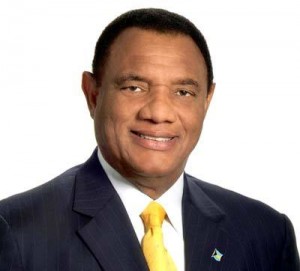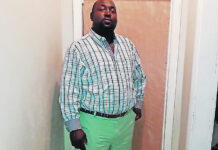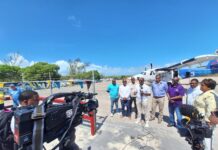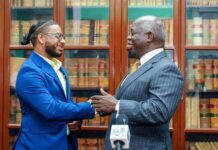
Remarks By
The Right Honourable
Perry G. Christie
Prime Minister Of The Commonwealth Of The Bahamas
At The
Opening Of The
Marjorie Davis Institute For Special Education
Thursday, 16th April, 2015
I am grateful for the opportunity to address you at the opening of this institution for special education.
It should be no surprise that education is a priority for my government. It is through education that we promote the development of our people and the nation as a whole.
The primary goal of education in the Commonwealth of the Bahamas is to ensure that all persons, respective of their islands of residence, develop physically, mentally, socially and spiritually in order to function responsibly and productively in an increasingly dynamic, scientific, technological and complex society and a world where there is instant connectivity and one that is increasingly inter-dependent.
The tremendous strides that we as a nation have made in education since 1967, if we were to chose a date of relevance have been tremendously downplayed or mis-understood. If you were to only pay attention to the media, it would seem as if we have not met our goals and that we have not achieved much in regards to education throughout the years. But I would like to use this opportunity to enlighten those who may be too young to know, of the remarkable progress that successive governments have made in revolutionizing the educational system in The Bahamas. I would also like to celebrate one of the many unsung heroes of education, an individual who has done so much to establish and promote education in The Bahamas and to whom we owe our sincerest gratitude.
According to George Orwell “The most effective way to destroy people is to deny and obliterate their own understanding of their history.” It is my goal today to acknowledge our history instead of denying it, to celebrate it instead of obliterating it, so that we gain a
better appreciation of who we are as a people and of how far we have come.
Ladies and Gentlemen:
In the first half of the 20th century, an organized national system of education did not exist.
The first schools in The Bahamas were not run by the government, but run by the churches. The Anglicans, Catholics and Baptists ran some of the very first schools in the country, along with the Methodists and Presbyterians. Our Lady’s Catholic School, for example, was opened on these very grounds in 1927. The Government of The Bahamas is extremely thankful for the church and its contribution to education, but the fact of the matter remained, that there existed no national plan for education in those days.
Real, systemic change began in the years leading up to Independence, just some 50 years ago, when Majority Rule was achieved in 1967 by Sir Lynden
Pindling’s Progressive Liberal Party. It was then that we decided that The Bahamas would adopt universal access to education; meaning, that every child in The Bahamas, as a right, would have the opportunity to access formal education through secondary school.
It was at this time and the decades that followed that we saw a multiplicity of initiatives adopted by the Government to ensure that our students were ready for and were able to participate in our new nation:
o A teachers college was formally re-opened in 1964, the previous one having been arbitrarily closed in 1958. The period between 1958 and 1964 could be called the lost era as there was no way for aspiring teachers to become formally certified without going overseas for training. As a result of this our standard of education suffered badly.
o Public secondary education was extended to the Family Islands and a secondary school scholarship programme was established;
o Private schools were encouraged to offer more places to students as the government significantly expanded its subventions and grants programme, which enabled private schools to accommodate students, who prior to this period, would not have been able to gain access; The Common Entrance Examination which was introduced as an equalizing entrance examination for those students wishing or who had an interest in attending private schools also aided this process and two elite private schools, St. Augustine’s and Queen’s College accepted scores of students as boarding students for a time.
o Between 1967 and 1975 the Government vastly increased access to its public schools by an ambitious building programme and introducing a high school curriculum that saw students taking terminal exams such as the GCE; R.M. Bailey, then called Highbury High School was a fore –runner of this type of secondary scholl educational development and others were to follow in Grand Bahama and the Family Islands;
today these high schools have a full curriculum and many rival the best of the private schools.
o The College of the Bahamas was established by an Act of Parliament in 1974;
o The public preschool program was initiated in the late 1980s;
o A new examination, The Bahamas General Certificate of Secondary Education, was introduced in 1993, and was spearheaded by Miss Marjorie Davis herself; and
o The Education Act was amended to raise the school leaving age to 16, in 1996.
o Technical and Vocational Education was solidified through the establishment of the National Training Council in 1982, now the Bahamas Technical and Vocational Institute which has a very high reputation and standard and since 1982 has turned out thousands of artisans with various skills.
Today, with education receiving the lion’s share of government funding in every budget, an average teacher student ratio of 14:1, qualified, expert
teachers, technologically outfitted classrooms, a soon to be University of the Bahamas, technical and vocational schools, a national high school diploma program, and institutions of special learning such as this one, it’s hard to imagine that many of our grandparents and great grandparents never attended school beyond the sixth grade and had to leave on attaining the age of 14 years. That not so distant past, however was indeed our humble beginning and we have made tremendous advancement.
Today, the top echelon of our student body leaves school as accomplished scholars, able to pursue tertiary level education at the best universities and technical colleges in the world, where many of them perform exceptionally well.
Our private and public schools have equipped our students with the tools to pursue higher education and become top notch teachers, nurses, doctors, lawyers, accountants, bankers, talented artists, musicians, crafts persons, acclaimed chefs, tourism
practitioners, and successful entrepreneurs and business managers.
Now, before I am accused of painting a ‘lily white’ picture of education, we must acknowledge that there is still much to be achieved and accomplished
We know that we must improve literacy and numeracy; we know that we must get more of our young men to engage in education and we know that we must better prepare our students for the national workforce and the global community. Nonetheless, we must also acknowledge the great strides we have made in education, which have resulted in the advancement of our people and society as a whole.
I am confident that the Ministry and Department of Education are working to continuously transform education.
Next month in fact, your Minister of Education will travel to discuss our post 2015 goals for education at an educational forum in Korea, and this summer the Bahamas will host ministers and education officials to the 19th Conference of Commonwealth Education Ministers to discuss regional educational goals. We are doing our best to make sure that our national initiatives are in line with global advancements in education.
Ladies and Gentlemen;
The reason why we are here today is because of another recent goal of our government, which is to meet the needs of our “special students”. This institute for special education is considered a vital step toward fulfilling my government’s commitment to making special education a priority.
As many of you know, I have an exceptional child. His name is Adam and he is now twenty seven years old. Like every parent of exceptional children I worry about Adam’s future and its limited possibilities in The Bahamas. It is because of my son that I have first-hand experience with the challenges and
dedication required in educating children with special needs; be they mild or exceptional. It is also because of him that I became more aware of the many families who struggle to educate and care for exceptional children.
All good parents at one point or another have asked themselves, “What will happen to my child when I am no longer there?” As a citizen of this country and leader of this great nation, it has been a personal commitment of mine and this government to see more advances in the area of educational support and developing expertise in accommodating children with special needs.
In 2013, the former Our Lady’s Catholic School was leased by the Government of the Commonwealth of The Bahamas with the goal of being transformed into a special education center for students, with a focus on research and training.
The Institute was officially opened to students on January 7th of this year. At that time, it held 1/5th of its present population. As you have heard, It is comprised of four major areas; Diagnostic and
Consultative Services, Intervention Services, Training Services and Research. In short, the institute services children with mild learning and developmental disabilities who represent the largest proportion of all students with disabilities here in The Bahamas. It is the perfect environment to properly diagnose and assess how our exceptional children learn and wherever possible, help them to be able to matriculate back into to the regular school system.
We anticipate that this institute will become the envy of our region. We will use it to catapult us further into understanding the learning disabilities and challenges that plague our nation.
Ladies and Gentlemen;
We came into our own as a nation in 1973 and the generation of men and women who helped transform our country were educated, hardworking civic revolutionaries who ignited the passion for transformation in the Commonwealth of the Bahamas.
Miss Marjorie Winton Theresa Davis, who was in the in the middle of her career during this era, helped to enhance the quality and breadth of learning across our archipelago of islands and simultaneously enhance the development of our nation.
Unofficially, one could say that Miss Davis began her teaching career in the 1930’s, as she was the second of twelve children born to the late Sir Cyrus Ulysses Davis and Hilda Davis. As an older sibling and especially during those times, the young Marjorie would have been responsible for the rearing and development of the younger children within her home. This could have been the catalyst for a lifelong career dedicated to putting others before self; a career dedicated to the rearing and development of the children of our nation.
Officially, Miss Davis began her career in education in 1950, as a teacher at Government High School, her alma mater. While there, she primarily taught Latin, a subject dreaded by many, but the foundation upon which most languages of today are based.
During the twenty years she spent at Government High, she came to be known and regarded as a dedicated teacher committed to bringing out the best within each of her students.
Shortly after Miss Davis obtained her Master’s Degree in Education in 1970, she began her career at the Ministry of Education Headquarters where she held various posts, including Senior Assistant Director. During this time she maintained responsibility for seven sections, including Technical and Vocational education, Special Schools, the Learning Resources and the Examination Section.
In 1977, in an era when the majority of women were still expected to work from the home, Miss Marjorie Davis became the first female Director of Education. Let us not underestimate this great accomplishment as it occurred during a time when many women were not given the opportunity to lead. Like the suffragettes in the generations before her, Miss Marjorie Davis blazed a trail for generations of female educators.
During her eleven years as Director of Education, Miss Davis brought great improvements to the Department of Education. She helped to establish in service training for clerical and teaching staff; she established annual teachers conferences and workshops; monthly principals meetings; gave recognition to long standing teachers in the private and public school systems; established student career days; helped to expand technical and vocational education and she helped to establish the College of The Bahamas.
Miss Davis was also instrumental in establishing the Bahamas General Certificate of Secondary Education Examination (The BGCSE). In 1988 she was contracted to coordinate the training of a team that would implement the first sitting of this national exam.
Again, let us not underestimate this achievement.
Prior to the implementation of the BGCSE examination, the majority of Bahamian students left high school, without completing a national senior examination. A significant percentage of the
population was, therefore, unable to pursue further studies and was debarred from accessing certain jobs in the country. Consequently, there existed a systemic inequality when it came to social and economic success. Miss Marjorie Davis led the team that helped to develop a national examination that allowed public and private school students to matriculate into international institutions of higher learning as well as find employment in higher level positions. Miss Davis helped Bahamians achieve equal access to opportunity and provided a level of equality among all students from both public and private schools.
Again, Miss Marjorie Davis can be credited for helping to birth a nation. She blazed a trail, not just for one student, or one class, or one school, but for every single student of this great nation.
It would be remiss of me if I failed to mention that Miss Davis is not only an outstanding educator, but also a model citizen. Miss Davis is a proud Zonta, a devoted member of St. Francis Xavier Cathedral, one of the longest serving active Girl Guide Leaders
(serving since 1946), she served as a volunteer with the Let’s Read Bahamas Programme, the National Art Gallery of the Bahamas, the Ranfurly Home for Children , the PACE programme for unwed mothers and she has also been active with health and HIV/AIDS projects throughout the years. Her achievements and her commitment to service has been recognized through numerous awards such as the Queen’s New Years Honour Award (OBE), the Living Legends Award from the Zonta Club of New Providence and the Lady Sassoon Golden Heart Award from the Sir Victor Sassoon Heart Foundation, and this is only naming a few.
With a portfolio of accomplishments such as this, it is astonishing to hear that Miss Marjorie Davis is a quiet person by nature. I have also been told however, not to underestimate Miss Davis, as she is a woman who gets things done. She is a woman who will take the road less travelled, but one who is not afraid to do so. Sometimes, we tend to incorrectly assume that the person that makes the loudest noise, accomplishes the most. More often than not however, success
comes to those who are quiet and dedicated like Miss Davis.
The well-known quote by Henry Wadsworth Longfellow reminds me of Miss Davis; “The heights by great men reached and kept were not attained by sudden flight, but they, while their companions slept, were toiling upward in the night.”
Ladies and Gentlemen,
For 65 years Miss Marjorie Winton Theresa Davis has displayed a deep level of concern for our students and our country and its place within this region and the wider world, and like many great leaders of our time, Miss Davis has and still is demonstrating by word and deed, the importance of giving back. In this way, Miss Davis can be added to the list of women who have made significant contribution to the growth and development of our Bahamian society and it is for this reason that we have gathered here today to open this educational institution in her name.
I am certain that the administrators and teachers of this great school will be motivated to continue to strive for excellence and continue the legacy of Miss Davis by ensuring that our students embrace and receive the full benefits of the knowledge and skills offered to them in the halls of this school.
Ladies and Gentlemen;
I thank the Minister of Education, the Honourable Jerome K. Fitzgerald and the personnel of the Ministry and Department of Education for their commitment to the children of our nation.
I also thank the Catholic Diocese for their continued support in education and for partnering with the Government over the years, especially for allowing us to utilize its facilities after deciding to amalgamate Our Lady’s Catholic School with St. Francis Catholic School. The refurbishment of this building is something to behold, situated here in the heart of our “Over the Hill” District here on historic Deveaux St. What we have done here is an example of what we can and will do in other areas of our city, crying out for re-development. This is but a start.
I acknowledge the Principal, and the administration, teachers and staff for the dedication, perseverance and hard work that they displayed throughout the process of opening the school and their part in organizing the festivities for today. Finally, I’d like to thank Miss Marjorie Davis for her contributions to this great country of ours.
I close by thanking the parents, guardians and community stakeholders who recognize the importance of parental involvement in the school’s success and are present consistently to support their children and the work of the school.
It now gives me great pleasure, in honour of an outstanding Bahamian educator, to declare the Marjorie Davis Institute for Special Education officially opened.
Thank you.







